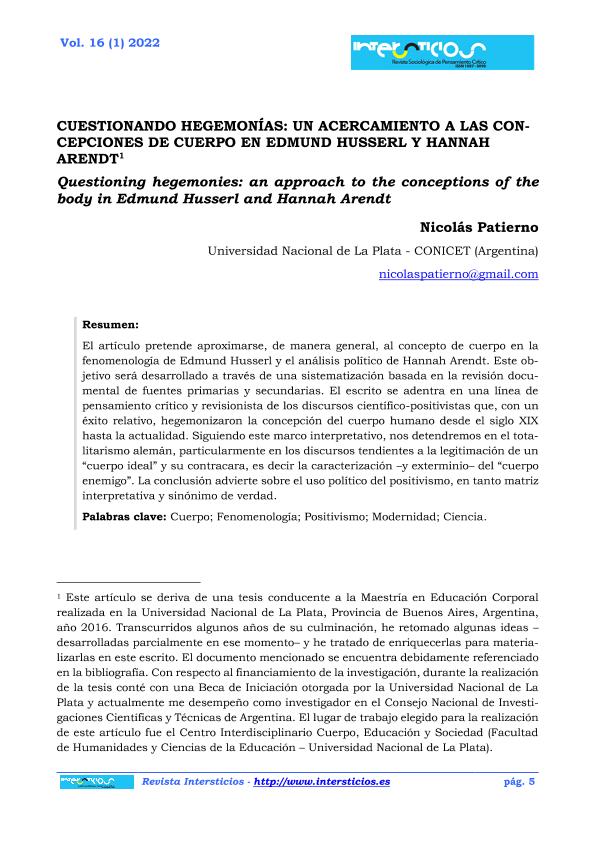Mostrar el registro sencillo del ítem
dc.contributor.author
Patierno, Nicolas

dc.date.available
2023-08-15T17:53:48Z
dc.date.issued
2022-03
dc.identifier.citation
Patierno, Nicolas; Cuestionando hegemonías: un acercamiento a las concepciones de cuerpo en Edmund Husserl y Hannah Arendt; Universidad Complutense de Madrid; Intersticios; 16; 1; 3-2022; 5-18
dc.identifier.issn
1887-3898
dc.identifier.uri
http://hdl.handle.net/11336/208391
dc.description.abstract
El artículo pretende aproximarse, de manera general, al concepto de cuerpo en la fenomenología de Edmund Husserl y el análisis político de Hannah Arendt. Este objetivo será desarrollado a través de una sistematización basada en la revisión documental de fuentes primarias y secundarias. El escrito se adentra en una línea de pensamiento crítico y revisionista de los discursos científico-positivistas que, con un éxito relativo, hegemonizaron la concepción del cuerpo humano desde el siglo XIX hasta la actualidad. Siguiendo este marco interpretativo, nos detendremos en el totalitarismo alemán, particularmente en los discursos tendientes a la legitimación de un “cuerpo ideal” y su contracara, es decir la caracterización –y exterminio– del “cuerpo enemigo”. La conclusión advierte sobre el uso político del positivismo, en tanto matriz interpretativa y sinónimo de verdad.
dc.description.abstract
The article aims to approach, in a general way, the concept of the body in Edmund Husserl's phenomenology and Hannah Arendt's political analysis. This objective will be developed through a systematization based on the documentary review of primary and seconda ry sources. The writing delves into a line of critical and revisionist think- ing of the scientific - positivist discourses that, with relative success, hegemonized the conception of human body from the 19th century to the present. Following this interpretative framework, we will stop at German totalitarianism, particularly in the speeches aimed at the legitimation of an "ideal body" and its other side, that is, the characterization – and extermination – of the "enemy body". The conclusion warns about the politic al use of positivism, as an interpretive matrix and synonymous with truth.
dc.format
application/pdf
dc.language.iso
spa
dc.publisher
Universidad Complutense de Madrid
dc.rights
info:eu-repo/semantics/openAccess
dc.rights.uri
https://creativecommons.org/licenses/by/2.5/ar/
dc.subject
CUERPO
dc.subject
FENOMENOLOGÍA
dc.subject
MODERNIDAD
dc.subject
POSITIVISMO
dc.subject.classification
Otras Humanidades

dc.subject.classification
Otras Humanidades

dc.subject.classification
HUMANIDADES

dc.title
Cuestionando hegemonías: un acercamiento a las concepciones de cuerpo en Edmund Husserl y Hannah Arendt
dc.title
Questioning hegemonies: an approach to the conceptions of the body in Edmund Husserl and Hannah Arendt
dc.type
info:eu-repo/semantics/article
dc.type
info:ar-repo/semantics/artículo
dc.type
info:eu-repo/semantics/publishedVersion
dc.date.updated
2023-07-06T21:51:29Z
dc.journal.volume
16
dc.journal.number
1
dc.journal.pagination
5-18
dc.journal.pais
España

dc.journal.ciudad
Madrid
dc.description.fil
Fil: Patierno, Nicolas. Consejo Nacional de Investigaciones Científicas y Técnicas. Centro Científico Tecnológico Conicet - La Plata. Instituto de Investigaciones en Humanidades y Ciencias Sociales. Universidad Nacional de La Plata. Facultad de Humanidades y Ciencias de la Educación. Instituto de Investigaciones en Humanidades y Ciencias Sociales; Argentina
dc.journal.title
Intersticios
dc.relation.alternativeid
info:eu-repo/semantics/altIdentifier/url/https://intersticios.es/article/view/22158
Archivos asociados
